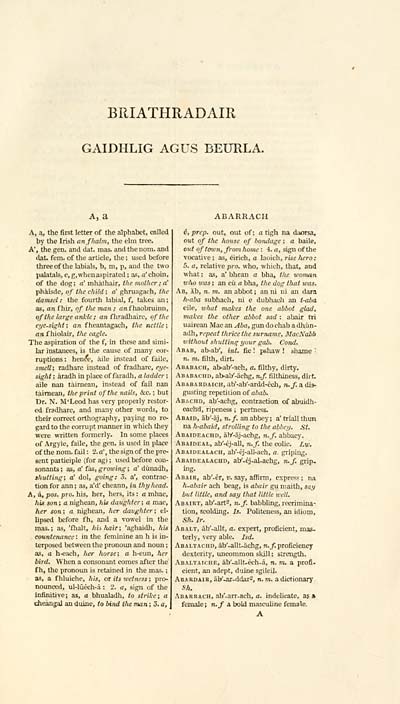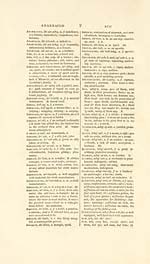Download files
Complete book:
Individual page:
Thumbnail gallery: Grid view | List view

BRIATHRADAIR
GAIDHLIG AGUS BEURLA.
A, a
A, a, the first letter of the alphabet, called
by the Irish anfhalm, the elm tree.
A', the gen. and dat. naas. and the nom. and
dat. fem. of the article, the ; used before
three of the labials, b, m, p, and the tivo
palatals, e, g, when aspirated ; a.s, a' ehoin,
of the dog; a' mhathair, the mother ; a'
phàisde, of the child ; a' ghruagach, the
damsel : the fourth labial, f, takes an ;
as, an fhir, of the man ; anfhaobruinn,
of the large anide ; a« fhradhairc, qft/ie
eye.^ight; an fheantagach, the nettle;
an f hiolair, the eagle.
The aspiration of the f, in these and simi-
lar instances, is the cause of many cor-
ruptions : henfe, àile instead of fiile,
smell; radharc instead of fradharc, eye-
sight ; àradh in place of faradh, a ladder ;
aile nan tairnean, instead of fail nan
taimean, the print of the nails, &c. ; but
Dr. N. M'Leod has very properly restor-
ed fradharc, and many other words, to
their correct orthography, paying no re-
gard to the corrupt manner in which they
were written formerly. In some places
of Argyie, faile, the gen, is used in place
of the nom. fail : 2. a', the sign of the pre-
sent paitjciple (for ag) ; used before con-
sonants ; as, a' fas, growing ; a' dùnadh,
shutting; a' dol, going: 3. a', contrac-
tion for arm ; as, a'd' cheann, in thy head.
A, a, pos. pro. his, her, hers, its : a mhae,
his son ; a nighean, Jiis daughter; a mac,
her son; a nighean, her daughter; el-
lipsed before fh, and a vowel in the
mas.; as, 'fhalt, his hair; 'aghaidli, his
countenance : in the feminine an h is in-
terposed between the pronoun and noun ;
as, a h-each, her horse; a h-eun, her
bird. When a consonant comes after the
f h, the pronoun is retained in the mas. ;
as, a f hluiche, his, or its wetness ; pro-
nounced, ul-lùèch-à : 2. a, sign of the
infinitive; as, a bhualadh, to strihe; a
cheangal an duine, to bind the man ; 5. a.
ABARRACH
è, prep, out, out of; a tigh na daorsa,
out of the house of bondage ; a baile,
out of town, from home : 4. a, sign of the
vocative; as, èirich, a \a.o\ch, rise hero:
5. a, relative pro. who, which, that, and
what ; as, a' bhean a bha, the woman
who ivas ; an eù a bha, the dog thai was.
Ab, Xb, n. m. an abbot ; an ni ni an dara
h-aba subhach, ni e dubhacli an t-aba
eile, what makes the one abbot glad,
makes the other abbot sad : abair tii
uairean Mac an Aba, gun do chab a dhun-
adh, repeat thrice the surname, MacNabb
u'jthout shutting your gab. Cond.
Abab, ab-ab', int. fie ! pshaw ! shame •
n. m. filth, dirt.
Ababach, ab-alZ-ach, a. filthy, dirty.
Ababachd, ab-ab'-aehg, n.f. filthiness, dirt.
Ababardaich, ab'-aiy-ardd-ech, n.f. a dis-
gusting repetition of abab.
Abachd, ab'-achg, contraction of abiudh-
eachd, ripeness ; pertness.
Abaid, ab'-àj, n.f. an abbey; a' triall thun
na h-abaid, strolling to the abbey. St.
Abaideachd, alZ-aj-achg, n.f. abbacy.
Abaideal, ab'-ej-all, n.f. the cohc. Lw.
Abaidealach, ab'-ej-all-ach, a. griping.
Abaidealachd, ab'.èj-al-achg, n.f. grip.
ing.
Abair, ab'-èr, r. say, afErm, express; na
h-abair ach beag, is abair gu maith, say
but little, and say that little well.
Abairt, ab'-art3, n.f. babbling, recrimina-
tion, scolding. Is. Politeness, an idiom,
Sh. Ir.
Abalt, ab'-aUt, a. expert, proficient, mas-
terly, very able. Isd.
Abaltacud, àb'-allt-àchg, n.f. proficiency
dexterity, uncommon skill ; strength.
Abaltariie, àb'-allt-èch-à, n. ?«. a profi-
cient, an adept, duine sgileij.
Abardaih, àb'-ar-ddar2, n. m. a dictionary
Sh.
Abarrach, ab'-arr-ach, a. indelicate, a; »
female; n.f a bold masculine female.
A
GAIDHLIG AGUS BEURLA.
A, a
A, a, the first letter of the alphabet, called
by the Irish anfhalm, the elm tree.
A', the gen. and dat. naas. and the nom. and
dat. fem. of the article, the ; used before
three of the labials, b, m, p, and the tivo
palatals, e, g, when aspirated ; a.s, a' ehoin,
of the dog; a' mhathair, the mother ; a'
phàisde, of the child ; a' ghruagach, the
damsel : the fourth labial, f, takes an ;
as, an fhir, of the man ; anfhaobruinn,
of the large anide ; a« fhradhairc, qft/ie
eye.^ight; an fheantagach, the nettle;
an f hiolair, the eagle.
The aspiration of the f, in these and simi-
lar instances, is the cause of many cor-
ruptions : henfe, àile instead of fiile,
smell; radharc instead of fradharc, eye-
sight ; àradh in place of faradh, a ladder ;
aile nan tairnean, instead of fail nan
taimean, the print of the nails, &c. ; but
Dr. N. M'Leod has very properly restor-
ed fradharc, and many other words, to
their correct orthography, paying no re-
gard to the corrupt manner in which they
were written formerly. In some places
of Argyie, faile, the gen, is used in place
of the nom. fail : 2. a', the sign of the pre-
sent paitjciple (for ag) ; used before con-
sonants ; as, a' fas, growing ; a' dùnadh,
shutting; a' dol, going: 3. a', contrac-
tion for arm ; as, a'd' cheann, in thy head.
A, a, pos. pro. his, her, hers, its : a mhae,
his son ; a nighean, Jiis daughter; a mac,
her son; a nighean, her daughter; el-
lipsed before fh, and a vowel in the
mas.; as, 'fhalt, his hair; 'aghaidli, his
countenance : in the feminine an h is in-
terposed between the pronoun and noun ;
as, a h-each, her horse; a h-eun, her
bird. When a consonant comes after the
f h, the pronoun is retained in the mas. ;
as, a f hluiche, his, or its wetness ; pro-
nounced, ul-lùèch-à : 2. a, sign of the
infinitive; as, a bhualadh, to strihe; a
cheangal an duine, to bind the man ; 5. a.
ABARRACH
è, prep, out, out of; a tigh na daorsa,
out of the house of bondage ; a baile,
out of town, from home : 4. a, sign of the
vocative; as, èirich, a \a.o\ch, rise hero:
5. a, relative pro. who, which, that, and
what ; as, a' bhean a bha, the woman
who ivas ; an eù a bha, the dog thai was.
Ab, Xb, n. m. an abbot ; an ni ni an dara
h-aba subhach, ni e dubhacli an t-aba
eile, what makes the one abbot glad,
makes the other abbot sad : abair tii
uairean Mac an Aba, gun do chab a dhun-
adh, repeat thrice the surname, MacNabb
u'jthout shutting your gab. Cond.
Abab, ab-ab', int. fie ! pshaw ! shame •
n. m. filth, dirt.
Ababach, ab-alZ-ach, a. filthy, dirty.
Ababachd, ab-ab'-aehg, n.f. filthiness, dirt.
Ababardaich, ab'-aiy-ardd-ech, n.f. a dis-
gusting repetition of abab.
Abachd, ab'-achg, contraction of abiudh-
eachd, ripeness ; pertness.
Abaid, ab'-àj, n.f. an abbey; a' triall thun
na h-abaid, strolling to the abbey. St.
Abaideachd, alZ-aj-achg, n.f. abbacy.
Abaideal, ab'-ej-all, n.f. the cohc. Lw.
Abaidealach, ab'-ej-all-ach, a. griping.
Abaidealachd, ab'.èj-al-achg, n.f. grip.
ing.
Abair, ab'-èr, r. say, afErm, express; na
h-abair ach beag, is abair gu maith, say
but little, and say that little well.
Abairt, ab'-art3, n.f. babbling, recrimina-
tion, scolding. Is. Politeness, an idiom,
Sh. Ir.
Abalt, ab'-aUt, a. expert, proficient, mas-
terly, very able. Isd.
Abaltacud, àb'-allt-àchg, n.f. proficiency
dexterity, uncommon skill ; strength.
Abaltariie, àb'-allt-èch-à, n. ?«. a profi-
cient, an adept, duine sgileij.
Abardaih, àb'-ar-ddar2, n. m. a dictionary
Sh.
Abarrach, ab'-arr-ach, a. indelicate, a; »
female; n.f a bold masculine female.
A
Set display mode to: Large image | Transcription
Images and transcriptions on this page, including medium image downloads, may be used under the Creative Commons Attribution 4.0 International Licence unless otherwise stated. ![]()
| Early Gaelic Book Collections > Blair Collection > Argyleshire pronouncing Gaelic dictionary > (57) |
|---|
| Permanent URL | https://digital.nls.uk/76240533 |
|---|
| Description | A selection of books from a collection of more than 500 titles, mostly on religious and literary topics. Also includes some material dealing with other Celtic languages and societies. Collection created towards the end of the 19th century by Lady Evelyn Stewart Murray. |
|---|
| Description | Selected items from five 'Special and Named Printed Collections'. Includes books in Gaelic and other Celtic languages, works about the Gaels, their languages, literature, culture and history. |
|---|

